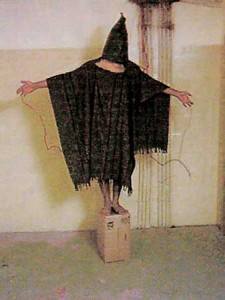Why Arabs Should Thank George Bush For Revolution In Egypt, Tunisia And Libya
 DID Abu Ghraib and US torture and abuses in Iraq and beyond open the eyes of the Arab world to the value of Human Rights? Shadi Mokhtari says they did.
DID Abu Ghraib and US torture and abuses in Iraq and beyond open the eyes of the Arab world to the value of Human Rights? Shadi Mokhtari says they did.
The Arabs could see the US as the bad guy- and that made Human Rights and the demand for them easier to swallow. Human Rights were now a universal issue. Egypt under Mubarak became just like America. And Egypt could be changed.
Only, what comes next? The Middle East has a history in one hideous regime after another. The US had a vote.
Mokhtari writes:
In the stunning popular uprisings that have been sprouting up throughout the Arab world, the desire for the realization of rights seems ubiquitous. For this, some have argued, George W. Bush deserves some credit. In fact, there is a link to be made between recent developments and Bush administration policies. However, it is not so much that we are finally seeing the fruits of the Bush era’s democracy and human rights promotion agenda, or that a liberated Iraq has now set an example for the rest of the region to follow. Rather, we are seeing the fruits of an Arab engagement with human rights which was in part spurred by the Bush Administration’s array of post-9/11 policies thwarting human rights.
Bush wins!
Before 9/11, the human rights idea was widely debated in the Arab world. Many voices including among Islamists argued that it was essentially a Western idea not compatible with Arab and Islamic values. It was also held that human rights were mainly an instrument the United States used to paint a moral veneer on self-interested agendas in the region. These arguments resonated with Arab populations because they tapped into widespread frustration with American policies. While they paid lip service to human rights internationally, the Arab world’s authoritarian rulers were all too happy to exploit this popular disillusionment with human rights and even reinforce its association with American cultural and political hegemony.
A particular event can trigger a rise or decline in rights consciousness in any country or culture in the world- East or West. Abu Ghraib served as a pivotal moment for human rights consciousness in the Arab world. Because the torture and abuse depicted was so widely seen as directed towards the Arab or Muslim man, many felt a profound sense of personal violation. As they grappled to formulate a response, they often found themselves invoking human rights…
Denials of fair trials in Guantanamo, CIA black sites, renditions of terrorist suspects to third countries known to torture, and legal formulations paving the way for “enhanced interrogation techniques” all brought discussions of human rights further to the fore of Arab consciousness. Instead of viewing human rights as a Western imposition, increasingly it became a language that Arab populations embraced to challenge America’s post-9/11 policies.
Interesting stuff. Bush was not everyone’s hero and liberator, but he did act. What will they say of Obama..?
Posted: 28th, February 2011 | In: Politicians Comment | TrackBack | Permalink


